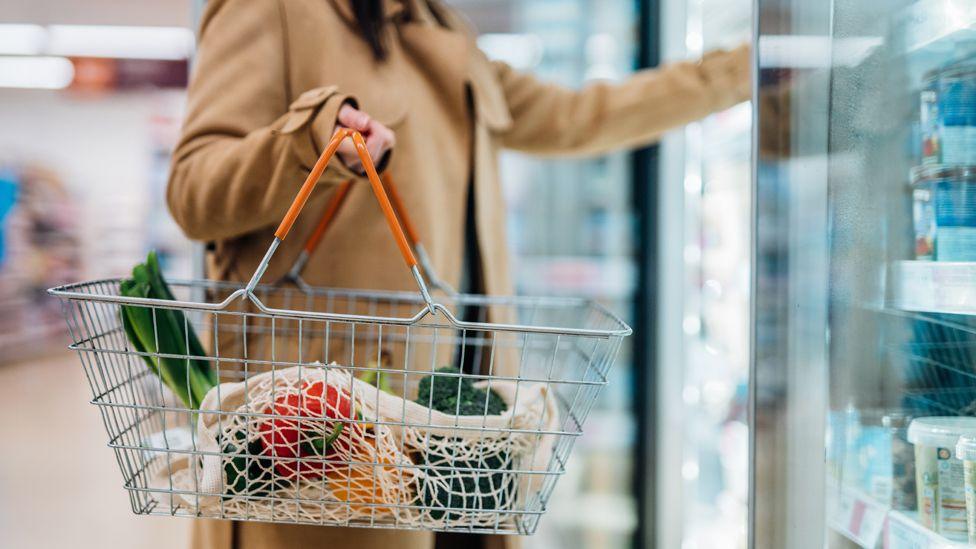UK forecast to have highest inflation among richest nations

- Published
The UK is forecast to see the highest rate of inflation of the G7 advanced economies this year, according to an influential global policy group.
The Organization for Economic Co-operation and Development (OECD) raised its prediction for UK inflation - the rate at which prices rise - to 3.5% across 2025, citing higher food costs as a factor.
It increased its forecast slightly for UK growth this year to 1.4%, but the economy is still expected to slow next year.
The report comes as Chancellor Rachel Reeves is preparing November's Budget in which she is expected to put up taxes or cut spending in order to stick to her own rules on government borrowing.
The OECD's UK inflation forecast for 2025 is higher than its previous estimate of 3.1%, and while the rate is expected to fall to 2.7% in 2026, that would still be the second highest in the G7.
Growth in the UK is predicted to slow to 1% next year, unchanged from the OECD's previous forecast in June.
It said this slowdown would be caused by a "tighter fiscal stance" - indicating either higher taxes or lower government spending - as well as increased trade costs and uncertainty.
Responding to the OECD's forecast, Reeves said the figures "confirm that the British economy is stronger than forecast - it has been the fastest growing of any G7 economy in the first half of the year".
"But I know there is more to do to build an economy that works for working people – and rewards working people."
Shadow chancellor Sir Mel Stride said the OECD confirmed "what hard-working families already feel - under Labour, Britain is in a high tax, high inflation, low growth doom loop".
"The UK is now teetering on the edge of stagflation, all driven by Labour's economic mismanagement."
Speculation about tax rises has been growing ahead of the Budget, with some analysts suggesting the chancellor will need to raise £20bn-£30bn in order to meet her self-imposed borrowing rules, which she has said are "non-negotiable".
On Tuesday, the Resolution Foundation think tank recommended cutting 2p from the employee National Insurance rate while adding the same amount to income tax, a move it says would raise £6bn.
However, Labour has promised not to raise taxes such as income tax, VAT or national insurance on "working people".
The latest monthly UK inflation figures showed the rate stood at 3.8% in August, driven by rising food prices, and in its latest forecast the OECD said the UK was one of several countries seeing higher food costs.
However, many UK companies have complained about increased costs from the rise in employers' National Insurance Contributions and a higher minimum wage.
Analysts say these higher costs have been passed on to consumers, which has pushed up inflation.
The current rate is well above the Bank of England's target of 2%, and the Bank has predicted it will hit 4% before falling back.
Last week, the Bank kept interest rates unchanged and warned the UK was not "out of the woods yet" when it came to inflation.
Why is UK inflation still rising?
- Published6 days ago
Food prices continue to surge as inflation remains at 3.8%
- Published17 September
When is the Budget and what might be in it?
- Published18 minutes ago
The OECD raised its forecast for growth in the global economy for 2025 saying it was more resilient than expected in the first half of the year.
It now expects growth of 3.2%, up from the 2.9% it had predicted in June, partly due to "front loading" of activity as firms sought to complete deals before new US tariffs kicked in.
In the US, growth has been helped by strong investment in tech areas such as artificial intelligence (AI), and the OECD has increased its growth forecast for the US this year to 1.8% from 1.6%.
However, the OECD warned growth would "soften noticeably" in the second half of the year as the impact of higher tariffs is felt.
Tariffs are taxes on imported goods and Trump has imposed such levies on products arriving on American shores from various countries.
The OECD said US tariff rates had increased on almost all countries since May, with the overall effective rate hitting 19.5% at the end of August, the highest since 1933.
Speaking to the BBC, OECD chief economist Alvaro Pereira said it was "absolutely essential" that countries around the world got together to lower trade barriers.
"It's important to remember that hundreds of millions of people came out of poverty because of trade growth, and also we know that open markets are usually good for business and good for technological development," he said.
Trump has argued the import taxes will boost US manufacturing and jobs, but several economists have warned it will push up prices for US consumers.
The OECD said the full impact of the tariffs has yet to be seen. Some changes are being phased in over time, it said, while some companies are accepting smaller profit margins for now.
However, it said the impact was "becoming increasingly visible in spending choices, labour markets and consumer prices".
"Growth is expected to soften noticeably in the second half of this year, as front-loading activity unwinds and higher effective tariff rates on imports to the United States and China dampen investment and trade growth," it said.